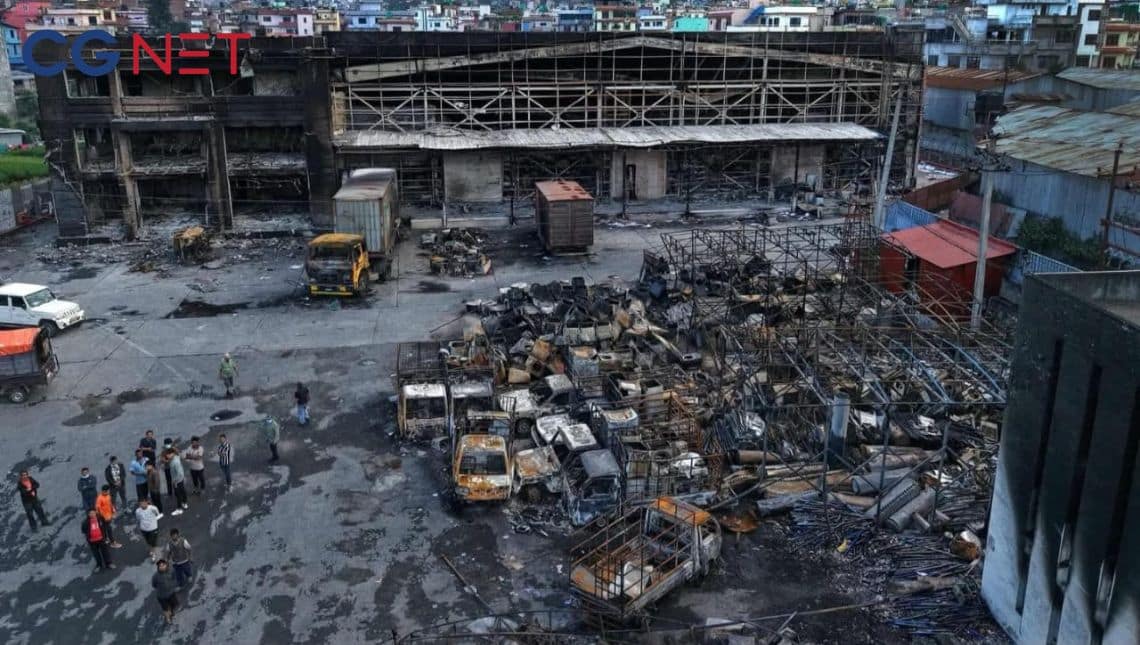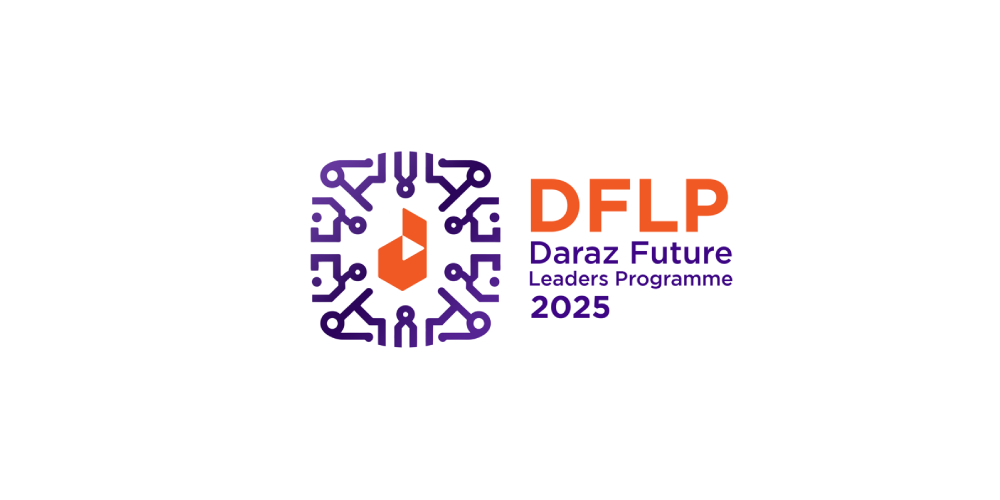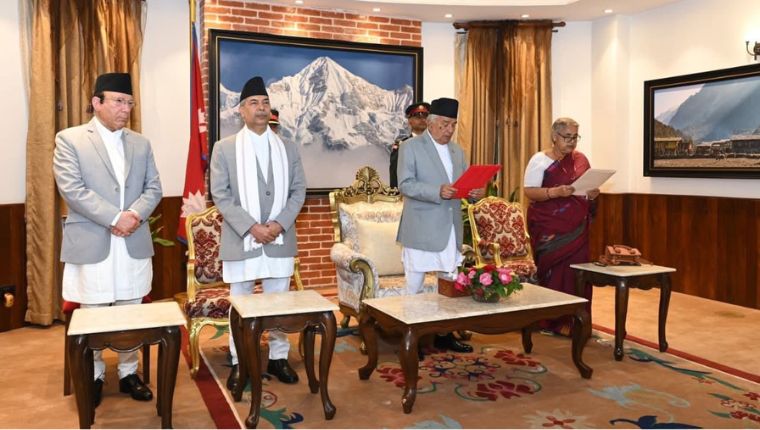KATHMANDU-Former Chief Justice Sushila Karki was sworn in today as Nepal’s interim prime minister at a special ceremony at Sheetal Niwas. Karki has been appointed as Nepal’s first woman Prime Minister following widespread youth-led demonstrations on September 6-7 (Bhadra 23-24). President Ram Chandra Paudel administered the oath of office and secrecy to Karki on Friday evening at the Presidential Palace, marking a historic milestone in Nepal’s political landscape.
Historic Appointment Amid Political Crisis
The appointment comes after unprecedented protests led by Generation Z activists that swept across the nation, demanding political reforms and fresh leadership. President Paudel’s decision to appoint Karki follows consultations with political parties and stakeholders, addressing the extraordinary circumstances that have gripped the country.
“Exercising the inherent constitutional authority of the President, and considering it necessary to uphold and protect Nepal’s Constitution and promote national unity, the President has appointed Sushila Karki as Prime Minister of the interim government for a period of six months, during which parliamentary elections must be conducted,” stated an official release from the Presidential Office.
Constitutional Framework and Electoral Mandate
Under the constitutional provisions, Prime Minister Karki has been mandated to conduct House of Representatives elections within six months of her appointment. The interim government structure represents a significant departure from Nepal’s traditional coalition politics, emerging from popular demand for systemic change.
The Presidential Office emphasized that the appointment was made “based on the recommendation and consent of the Head of State, in accordance with the constitutional restrictive provisions entrusted to the President by Nepal’s Constitution.”
Single-Person Cabinet Formation
Unlike traditional cabinet formations, Prime Minister Karki has taken the oath alone and will initially handle all government ministries personally. This unprecedented arrangement reflects the transitional nature of the administration and the focus on conducting free and fair elections within the stipulated timeframe.
The streamlined government structure is designed to ensure efficient decision-making during the critical transition period while maintaining essential government functions.
Distinguished Career Background
Sushila Karki brings extensive judicial experience to the executive role, having served as Nepal’s Chief Justice and established a reputation for principled decision-making. Her appointment represents a break from traditional party-based politics, aligning with the youth movement’s demands for technocratic leadership.
Her judicial background is expected to bring a fresh perspective to governance, emphasizing rule of law and constitutional adherence during this transitional period.
International and Domestic Presence at Swearing-In
The swearing-in ceremony at Sheetal Niwas (Presidential Palace) witnessed significant domestic and international participation:
Notable Domestic Attendees:
- Former Prime Minister Baburam Bhattarai
- Rastriya Swatantra Party MP Sumana Shrestha
- Entrepreneur Sanjog Koirala
- Ashish Man Singh Basnet
- Govinda Narayan
International Representation:
- Ambassadors from the United States
- Indian Ambassador
- Chinese Ambassador
- Representatives from other diplomatic missions
The diverse attendance underscores both domestic support for the transition and international interest in Nepal’s political developments.
Youth Movement’s Victory
The appointment represents a significant victory for Nepal’s Gen-Z movement, which demanded systemic political reforms and an end to traditional party dominance. The protests, characterized by their peaceful nature and clear demands for change, have successfully pressured the political establishment to consider alternative leadership models.
The youth-led demonstrations marked a watershed moment in Nepali politics, demonstrating the power of organized civic action in bringing about constitutional change within democratic frameworks.
Constitutional Significance
Prime Minister Karki’s appointment under Article 76 of Nepal’s Constitution represents the first time such provisions have been invoked following popular protests. The constitutional mechanism allows for interim government formation during extraordinary circumstances, providing a legal framework for the current transition.
Legal experts view this as a test case for Nepal’s constitutional democracy, demonstrating the system’s ability to respond to popular demands while maintaining institutional integrity.
Immediate Priorities and Challenges
The interim government faces several immediate challenges:
Electoral Preparation:
- Organizing free and fair parliamentary elections within six months
- Ensuring adequate security and administrative arrangements
- Maintaining political stability during the transition
Governance Continuity:
- Managing day-to-day government operations
- Addressing urgent economic and social issues
- Maintaining international diplomatic relations
Political Reconciliation:
- Building consensus among traditional political parties
- Addressing youth movement demands for systemic reforms
- Ensuring peaceful political transition
Regional and International Implications
Nepal’s political transition has attracted significant regional and international attention, particularly given the country’s strategic location between India and China. The presence of major power ambassadors at the swearing-in ceremony indicates continued international engagement with Nepal’s democratic processes.
The appointment of a technocratic leader following popular protests may serve as a model for other South Asian democracies facing similar challenges of youth disillusionment with traditional politics.
Road Ahead
Prime Minister Karki’s six-month tenure will be closely watched as a crucial test of Nepal’s democratic institutions and their ability to respond to popular demands for change. The success of this interim arrangement could potentially reshape Nepal’s political landscape and establish new precedents for crisis management within constitutional frameworks.
The electoral process scheduled within six months will determine whether this transition leads to lasting political reforms or represents a temporary interruption in Nepal’s traditional political patterns.
Historical Context
This appointment makes Sushila Karki not only Nepal’s first woman Prime Minister but also the first non-party affiliated Prime Minister to assume office following popular demonstrations. Her judicial background and the circumstances of her appointment distinguish this administration from previous governments in Nepal’s democratic history.
The successful completion of her mandate and the conduct of free and fair elections will likely determine the long-term impact of this historic moment on Nepal’s political evolution.
Sushila Karki: From Nepal’s First Woman Chief Justice to Historic Prime Minister






















Comments